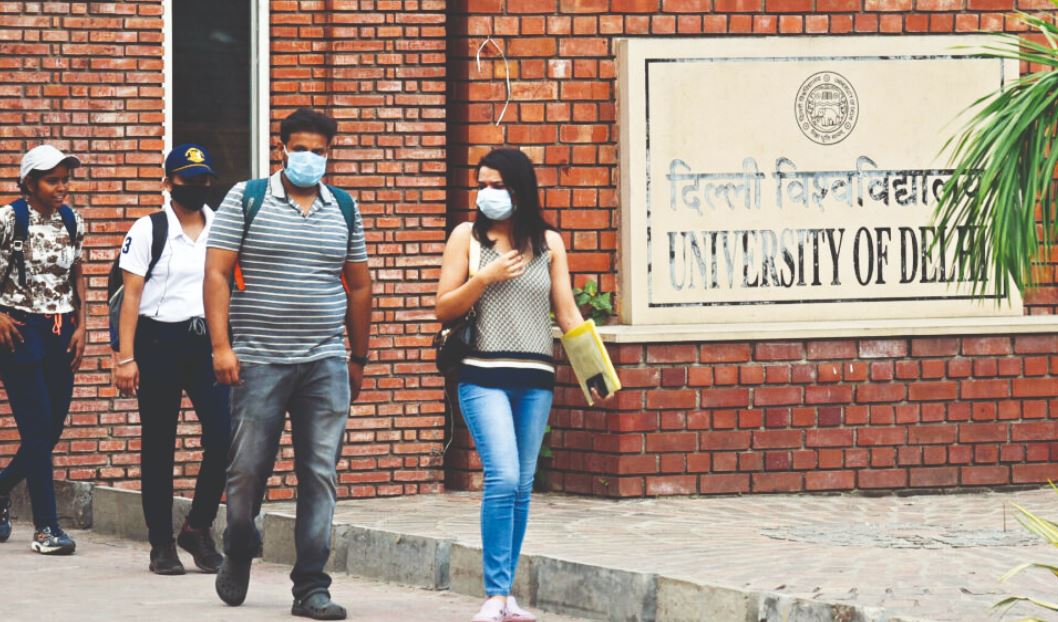- By Sarju Saran Tiwari
- Fri, 27 Jun 2025 04:20 PM (IST)
- Source:JND
DU's Proposed Syllabus Overhaul: Delhi University (DU) is embroiled in a significant academic debate as its syllabus panel has recommended the potential removal of several key elective papers from the MA Political Science postgraduate syllabus. Courses focusing on regions and themes such as 'Pakistan and the World', 'China’s Role in the Contemporary World', 'Islam and International Relations', 'Pakistan: State and Society', and 'Religious Nationalism and Political Violence' are reportedly on the chopping block.
This proposed overhaul has immediately ignited a strong backlash from faculty members, many of whom describe the move as politically driven and detrimental to academic integrity.
The university’s Standing Committee on Academic Matters recently convened to deliberate on the syllabi of various courses, where the Political Science PG syllabus came under "significant scrutiny." Dr. Monami Sinha, a member of both the Standing Committee and the Academic Council, confirmed that these specific papers are slated to be either entirely dropped or replaced by alternative courses. The revised syllabi would then undergo a multi-stage approval process, beginning with the department’s course committee, followed by the university syllabus panel, and finally the Academic Council.
This development follows earlier statements from Delhi University Vice Chancellor Yogesh Singh, who had reportedly asked department heads to review their syllabi and remove any "unnecessary glorification of Pakistan," particularly in the wake of a terror attack in Jammu and Kashmir's Pahalgam on April 22. This contextual backdrop has fueled allegations from faculty members that the proposed revisions are "forced," "retrograde," and ideologically motivated, challenging the core principles of academic autonomy.
Faculty Resistance and Academic Freedom Concerns:
The potential removal of these courses has triggered significant apprehension among the DU faculty, who argue that such changes could severely undermine the academic rigor and geopolitical understanding offered to students.
Dr. Monami Sinha explicitly stated that "It is imperative to study Pakistan in detail because, pedagogically, we need to train our students and foster scholarship on Pakistan, as it remains one of India’s constant foreign policy challenges." She also cautioned against the exclusion of China, especially at a time when it is emerging as a critical global player, particularly in the Global South. These concerns highlight a fundamental tension between perceived national interests and the comprehensive, unbiased study of international relations.
The proposed revisions extend beyond Political Science, raising broader alarms about academic freedom across disciplines. In MA Geography, Unit 3 of Semester 1, which addresses internal conflict and religious violence (including a key text by Paul Brass), was recommended for removal.
The Social Geography paper saw objections to the topic "Distribution of SC Population," with calls for a de-emphasis on caste-related content, and a course on vulnerability and disaster was also proposed to be dropped.
In Sociology, the introductory theory paper was criticized for its sole reliance on Western theorists like Marx, Weber, and Durkheim, with calls for the inclusion of Indian theorists and joint family structures. Furthermore, objections were raised to Kath Weston’s reading on same-sex families, citing India's legal stance on same-sex marriages.
Abha Dev, Secretary of the Democratic Teachers’ Front (DTF), strongly condemned these recommended changes, alleging that the academic autonomy of departments has been eroded. She expressed concern that "The dumbing down of courses by revisions centred around 'beliefs' rather than questions of pedagogy and scientific inquiry is unfortunate.
Forced revisions are retrograde and are politically motivated." Mithuraaj Dhusiya, an elected member of the Academic Council, questioned the Standing Committee’s authority, asserting that while panels can suggest changes, they cannot directly mandate departments to remove papers. He emphasized that universities should foster critical thinking and dispassionate debate, rather than producing conformist minds.


